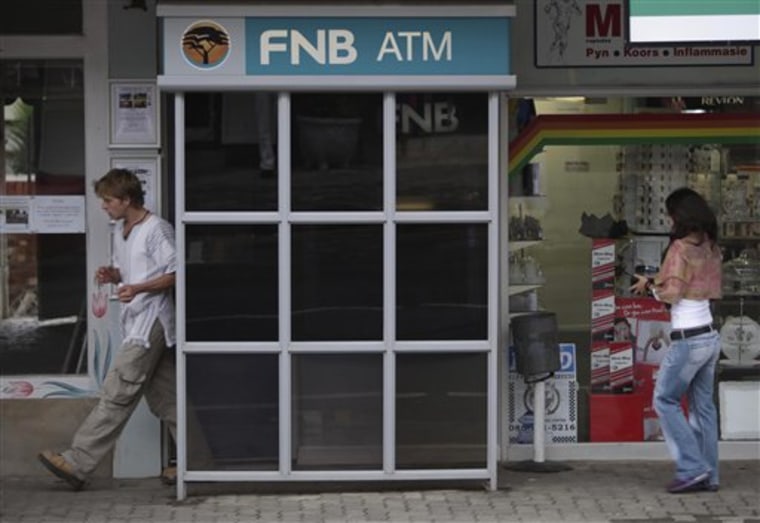Do plan ahead. Don't let your credit card out of your sight. But don't bother with the stab-proof vests.
Few football fans coming to South Africa for the World Cup will have missed the news that crime in the country is high. South Africa's murder rate, according to the latest international figures, is 38.6 per 100,000 people, compared to less than one for Germany, the last country to host the World Cup. But worried visitors can take steps to reduce the risk.
Don't panic. But don't be complacent
Entrepreneurs offering to rent body armor to visitors play on fears every tourist is likely to be a victim, a scenario South African police reject.
Police spokesman Vish Naidoo said South African crime mirrors the pattern seen around the world: The majority of muggings, murders and other crimes are concentrated in a few areas plagued by drug use or destabilizing factors. In most cases, victims are South African and know the criminals.
Visitors who have come for international sports events in the past or for tourism are less likely to be victims, Naidoo said.
"People can draw confidence from that," he said. "There's no need to be paranoid."
Naidoo offered tips that would be familiar to those visiting urban areas around the world: Don't flaunt your valuables — hoteliers put safes in rooms for a reason. And don't walk alone in isolated places. Tap local knowledge — hotel staff, for instance, will be able to give guidance on safe neighborhoods in which to walk or jog.
South African police officers can also help, and Naidoo said they will be on the streets in large numbers during the World Cup, particularly on match days. A recruiting drive that began in 2004 was aimed at increasing police numbers by 55,000 to 200,000 nationwide by tournament time.
Naidoo said photographs of officers in uniform will be posted on the force's Web site so visitors can be sure of getting the right advice from the right people.
Be prepared
Gary Ronald, spokesman for the Automobile Association of South Africa, advises visitors planning to rent cars to ask for a GPS when they book, or bring their own — remembering to download southern African maps.
Streets names on old-fashioned maps might be outdated, and many South African streets lack road signs anyway. The roads themselves, though, particularly in the larger towns where football fans will be congregating, are generally in good condition.
Many restaurants and tourist destinations list directions on their Web sites, Ronald said.
Even those who plan ahead might get lost. Ronald suggests dropping into one of the country's large, modern and ubiquitous malls to ask for directions.
"We certainly wouldn't advocate just stopping and asking a stranger in the street," he said.
Keep cameras and handbags in the trunk, and windows rolled up while cruising through crowded downtowns.
Crime, of course, isn't the only safety concern on the road. Drivers used to keeping right may find it takes a few days to get used to keeping left in South Africa. They may never get used to South African-style driving, where the tone seems to be set by the drivers of minibus taxis known for sudden stops, lane changes without signaling and daring turns.
"The aggression that can be found on the roads can be really intimidating," Ronald said, adding his organization planned a campaign before the World Cup urging South Africans to stop barreling into lanes, use their signals, and consider allowing a fellow driver or two into traffic.
Be alert
South Africa has a modern economy linked to the global network. Bank cards from around the world can be used to draw money from South African ATMs, and restaurants, hotels and shops accept foreign credit cards. It's easy to travel in the country, but the conveniences draw sophisticated criminals, including members of international syndicates.
"They can skim a card here and within minutes, use it in the UK, before you can even leave the restaurant. That's how, with the electronic age, there are no borders anymore," said Kalyani Pillay, chief executive of an agency through which South African banks work with local government officials and with those abroad on security.
The South African Banking Risk Information Center's Web site includes photographs of skimming devices, battery-operated black boxes no bigger than a cell phone, that criminals use to record the information on a credit card's magnetic strip.
"The bit of advice we would give every single person in the universe: Do not let that card be swiped out of your sight," Pillay said.
She also advises consumers not to walk around with more cash or cards than necessary, and to take a moment to check that the card returned to them after a transaction is the right card. Keep PIN numbers to yourself and use ATMs in well-lit areas, ideally ones that are attached to bank branches.
Don't take advice on using the machine from anyone hanging around the area, not even someone who looks like a guard, and particularly not someone who offers help without being asked.
"The more sophisticated crimes become," Pillay said, "the more alert and educated the public needs to be."
